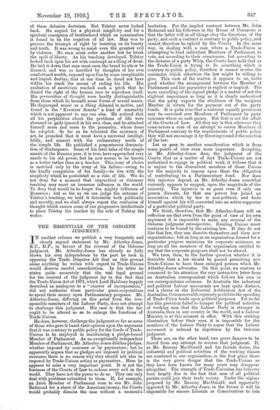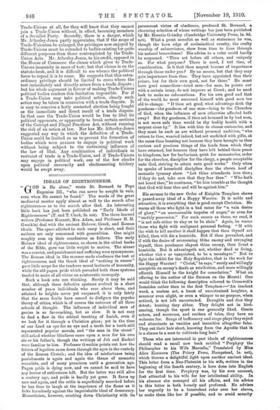THE ESSENTIALS OF THE OSBORNE JUDGMENT.
IN another column we publish a very temperate and clearly argued statement by Mr. Atherley-Jones, K.C., M.P., in favour of the reversal of the Osborne judgment. Mr. Atherley-Jones has already so fully shown his own independence by the part he took in opposing the Trade Disputes Aet that on this ground alone anything he writes with regard to Trade-Unions would deserve careful consideration. In his letter he states quite accurately that the real legal ground for the reversal of the judgment lay in the fact• that the Trade-Union Act of 1871, which Lord Halsbury happily described as analogous to a, " charter of incorporation," did not authorise these particular quasi-corporations to spend their money upon Parliamentary purposes. Mr. Atherley-Jones, differing on this point from the irre- sponsible members of the Labour Party, does not attempt to challenge this judgment. His case is that the law ought to be altered so as to enlarge the functions of Trade-Unions.
He does, however, challenge the judgment so far as some of those who gave it based their opinion upon the argument that it was contrary to public policy for the funds of Trade- Unions to be employed in maintaining a pledge-bound Member of Parliament. As an exceptionally independent Member of Parliament, Mr. Atherley-Sones dislikes pledges, whether imposed by caucuses or by paymasters ; but he apparently argues that as pledges are imposed by political caucuses, there is no reason why they should not also be imposed by Trade-Unions acting as paymasters. Here he appears to miss a very important point. It is not the business of the, Courts of Law- to redress every evil in the world. They have not the power to do so. They can only deal with problems submitted to them. If, for example, an .Irish Member of Parliament were to sue Mr. John Redmond for a share of the American:money, the Courts would probably dismiss the case without a moment's hesitation. For the implied contract between Mr. John Redmond and his followers in the House of Commons is that the latter will in all things obey the directions of the party, and such a contract is contrary to public policy, and cannot therefore be upheld by the Courts. In the same way, in dealing with a case where a Trade-Union is attempting to bind. individual Members of Parliament to vote, not according to their consciences, but according to the dictates of a party Whip, the Courts have held that as the Trade-Union is trying to do something which is contrary to public policy, therefore it cannot receive the assistance which otherwise the law might be willing to give. This view of the matter, it appears to us, holds good whether the arrangement between the Member of Parliament and his paymaster is explicit or implicit. The mere cancelling of the signed pledge is a matter of not the slightest importance so long as it is clearly understood that the party expects the obedience of the recipient Member in return for the payment out of the party funds. It is quite true that a restraint equally pernicious may be exercised over Members of Parliament by party caucuses where no cash passes. But that is not the affair of the Courts of Law. All they say is that wherever they come across a case of an attempt to coerce Members of Parliament contrary to the requirements of public policy they will not encourage it by throwing round it the sanction of the law.
Let us pass to another consideration which is from some points of view even more important. Accepting, as Mr. Atherley-Jones does, the judgment of the Courts that as a matter of fact Trade-Unions are not authorised to engage in political work, it follows that it is unjust to the dissentient members of those Unions for the majority to impose upon them the obligation of contributing to a Parliamentary fund. Nor does this injustice depend, as Mr. Atherley-Jones somewhat curiously appears to suggest, upon the magnitude of the minority. The injustice is as great even if only one person dissents, for that one person has joined. an association which by law is non-political, and finds himself against his will converted into an active supporter of a particular political party.
We think, therefore, that Mr. Atherley-Jones will on reflection see that even from the point of view of his own argument it is impossible to make any reversal of the Osborne judgment retrospective. Existing Unions must continue to be bound by the existing law. If they do not like that law, they can dissolve themselves and form new organisations ; but as long as an organisation formed for a particular purpose maintains its corporate existence, so long are all the members of the organisation entitled to say that the corporate purposes shall not be altered.
We turn, then, to the further question whether it is desirable that a law should be passed permitting new Trade-Unions to have those enlarged powers which Mr. Atherley-Jones advocates. On this point, we venture to commend to his attention the very instructive letter from an Australian correspondent which follows his own in our correspondence columns. In Australia the industrial and political Labour movements are kept quite distinct, and a clause in the Industrial Arbitration Act of the Australian Commonwealth expressly prohibits the spending of Trade-Union funds upon political purposes. Yet so far has this provision failed to hamper the political activities of working men that the Labour Party is stronger in Australia than in any country in the world, and a Labour Ministry is at this moment in office. With this striking illustration before their eyes, it is impossible for the members of the Labour Party to argue that the Labour movement is reduced to impotence by the Osborne judgment. There are, on the other hand, two grave dangers to be feared from any attempt to reverse that judgment. If, as Mr. Ramsay MacDonald. and his friends desire, the industrial and political activities of the working classes are combined in one organisation, in the first place there is the very grave danger that the Trade-Unions as they have been known for many years may disappear altogether. The strength of Trade-Unionism has hitherto been largely due to the fact that men of all political parties could join their trade society. Under the regime proposed by Mr. Ramsay MacDonald, and apparently approved by Mr. .A.therley-Jones, in the future it will be impossible for sincere Liberals or Conservatives to -loin Trade-Unions at all, for they will know that they cannot join a Trade-Union without, in effect, becoming members of a Socialist Party. Secondly, there is a danger, which Mr. Atherley-Jones partly appreciates, that if the scope of Trade-Unionism be enlarged, the privileges now enjoyed by Trade-Unions must be extended to bodice existing for quite different purposes than those contemplated by the Trade- Union Acts. Mr. Atherley-Jones, to his credit, opposed in the House of Common the clause which gives to Trade- Unions immunity in cases of tort; but that clause is on the statute-book, and it is difficult to see whence the political force to repeal it is to come. He suggests that this extra- ordinary privilege should be limited to cases where the tort immediately and directly arises from a trade dispute ; but his whole argument in favour of making Trade-Unions political bodies renders this limitation impossible. For if a Trade-Union may take political action, clearly such action may be taken in connexion with a trade dispute. It is easy to conceive a hotly contested election being fought as the immediate and direct result of a trade dispute. In that case the Trade-Union would be free to libel its political opponents, or apparently to break certain sections of the Corrupt and Illegal Practices Act, without running the risk of an action at law. Nor has Mr. Atherley-Jones suggested any way in which the definition of a Trade- Union could be limited so as to prevent the formation of bodies which were anxious to engage in political work without being subject to the restraining influence of the law of libel. Any combination of individuals in restraint of trade is a Trade-Union, and if Trade-Unions may engage in political work, one of the few checks upon political unveracity and electioneering trickery would be swept away.



































































 Previous page
Previous page